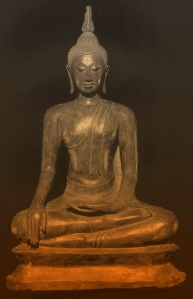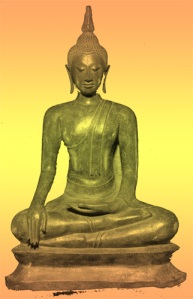Translated by Ajahn Sumedho

If we really investigate and examine our hearts [or minds], we will at some time experience joy, rapture and peace. At other times we will experience feelings of indifference, detachment and separation. If we experience the latter we should not blame the dharma [truth; the natural state; the teaching of the Buddha] because the dharma is the natural state. There are times when our hearts incline towards the dharma, and feelings of bliss and calm arise—feelings of complete contentment. At other times, the dharma seems far away. Rather than inclining towards it on those occasions, our hearts seem to move away. Accordingly, we do not taste the dharma: there is no calm, bliss, or joy, because the heart is depressed and negative; the dharma is not there. But if one is skilful one need not fall under the power of this negativity. When the heart is depressed, we can uplift it. If the mind wanders, we can control it and keep it from drifting.
When the heart is contented, one should maintain that contentment. Calm the mind when it is appropriate and uplift the heart when it is appropriate. By not following depression or elation we look after our hearts. This is the natural state; the heart is constant, equanimous and truthful. If one ceases to practise when feeling depressed and only practises when feeling good, one will be without consistency or endurance. Take care and train the heart until it is even and equanimous—continuously. Accordingly our hearts will then more and more incline towards the dharma; we will not forget the dharma. If our hearts are close to the dharma, on hearing it being expounded we will easily understand it, our hearts will become peaceful easily. But if our hearts are far from the dharma and our practice is not constant, we will become drawn away and even greater confusion will arise. We should train and discipline our hearts. When we realise the heart is confused, we should exert ourselves to practise. With this continuous and earnest exertion we will soon get good results.
Even to practise meditation for a short time will bring good results.
To bow and make obeisance, to recite the virtues of the Buddha, and do one’s duty are all good and worthy practices, but to listen to and contemplate the dharma is much higher; to reflect, recollect and to be completely familiar with the dharma is much, much higher. If one meets with the dharma and it reaches one’s heart, one will have a little peace for a little while; even if it is only for a second it is better than none at all. If this happens often, it will gradually brighten one’s life. It is like a flash of lightning in a dark sky; as the flashes increase we begin to know and understand. To practise meditation is like this—when one starts practising, one’s heart becomes more and more peaceful. Eventually it becomes truly calm in the dharma.
To be fully grounded in the dharma requires letting go of our moods and establishing ourselves in the dharmas of freedom, detachment, clarity, letting go, stopping and stillness. Even if this happens for one second only, it is of great worth because we shall experience true peace at last. One will then know for certain that there is true peace and how that peace is different from worldly happiness. The world constantly revolves; it is its nature to do so without stopping. Worldly happiness revolves around with it.
True peace is found only in the dharma. When we practise meditation and our hearts attain to the dharma of letting go, or non-attachment to all moods, feelings and emotions, when we do not incline towards or attach to any mood whatsoever, then we will escape the repetitious cycle of birth and death; then we will escape Samsara. We need not be reborn in the turbulent cycle of the world of birth and death. We can be at peace with it, no longer attached to it. When meditators are at peace, they have escaped confusion. When they have perfect understanding, they have escaped ignorance. When they are clear and empty, they have escaped agitation. When they have lightness, they have escaped heaviness. Such meditators know beyond doubt through direct experience. They go beyond doubts with regard to the most refined and highest speculations, like ‘Is there?’ or ‘Isn’t there?’ and speculations about the future and the past. When such meditators look at the world, they see only cause and effect, arising and passing away. And when the world passes away, it vanishes.
The arising and passing away of the world, cause and effect, is birth, or the arising of a condition, its duration and its death. Good and evil, coarse and refined, misfortune and good fortune are the world. When people commit good actions, they will receive good results; when they commit evil actions, they will receive evil results because they are attached to the world of cause and effect. When people are attached to causes they will receive effects, since this is the way of the world—they cannot escape it.

One who remains in the power of the world will never be able to escape it. But one who practises dharma and knows the world through insight, who is no longer attached to moods and emotions, has purified the heart from all defilements and has entered into dharma. This one has only ‘knowing’ remaining—the aware one. Any defilements that used to delude and confuse this person’s heart are no longer there. The heart is the heart of one who knows, The Awakened One. This is nirodha, the cessation of suffering. The affairs of the world can no longer enter the heart of such a person, where only buoyancy, clarity and emptiness remain—peace. This is Ultimate Truth.
One should let go and not cling to anything. When meditators are with the dharma, they know the dharma that I have just described. And when they investigate the world that manifests in there hearts, they will see for themselves that all conditions are unsatisfactory; they will see that to experience the unpleasant, to be separated from the pleasant or not to get what one wants, is the cause of suffering. For those with preferences, suffering is inevitable, since love and hate depend upon each other; when there is one there is the other. If we are no longer attached to anything, love and hate vanish; for these things are of equal value. We do not feel attraction to or aversion for the air around us. We should let go of joy and sorrow, love and hate; then, whatever conditions manifest in the heart, they will all have the same value; then we will not tremble with fear, become discontented, or react to praise and blame.
It is indeed possible to transcend love and hate, and to detach from excitement, success and failure. None of these conditions will then be weapons that stab at our hearts.
For those with preferences, suffering is inevitable.
This discourse was given in the early 1960’s by Ajahn Brahmamuni, late Abbot of Wat Borvornives in Bangkok. It has been translated into English by Ajahn Sumedho, Abbot of Amaravati Buddhist Monastery. Great Gaddesden, Hemel Hempstead, HP1 3BZ.
The Burdened Heart is published by kind permission of Chithurst Forest Monastery, Petersfield, Hants.
© Buddhist Publishing Group 1984, 2012
Click here for more Ajahn Brahmamuni teachings.
Categories: Ajahn Sumedho, Beginners, Buddhism, Buddhist meditation, Theravada

This was like a breath of fresh air for me today. This week threw me into a tailspin, until the calmness came. Thank you.
i’ve had this in my email box to read for sometime it is a reminder to start my practice once again thank you
Thank you. This past week has been very trying and this post was what I needed to help guide me.
Louise Amy D.de M.S., on 19th. February. 2012, 16:47p.m.Brazilian
time said:
Just for a very split, split second, it is as if one is going back home
somewhere in ones soul, to where one really belongs.
Thank you for giving me the chance to feel this Blessed moment.
May all Beings be free from Illusion. Thank you and Many Blessings.
Great reminder to continue to practice, regardless.
Thank you, and much metta.
Thank you metta xxx
Thoughtful and deep.
Thank you.
It’s a pleasure.
a bit of an aside but where is ajahn sumedho residing in thailand
Wat Pa Pong in N.E. Thailand as far as we know.